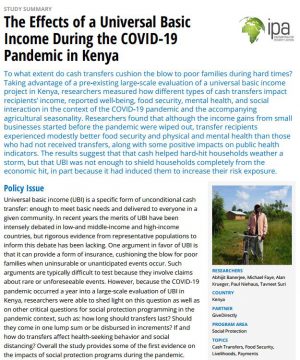
To what extent do cash transfers cushion the blow to poor families during hard times? Taking advantage of a pre-existing large-scale evaluation of a universal basic income project in Kenya, researchers measured how different types of cash transfers impact recipients’ income, reported well-being, food security, mental health, and social interaction in the context of the COVID-19 pandemic and the accompanying agricultural seasonality. Researchers found that although the income gains from small businesses started before the pandemic were wiped out, transfer recipients experienced modestly better food security and physical and mental health than those who had not received transfers, along with some positive impacts on public health indicators. The results suggest that that cash helped hard-hit households weather a storm, but that Universal Basic Income was not enough to shield households completely from the economic hit, in part because it had induced them to increase their risk exposure.




